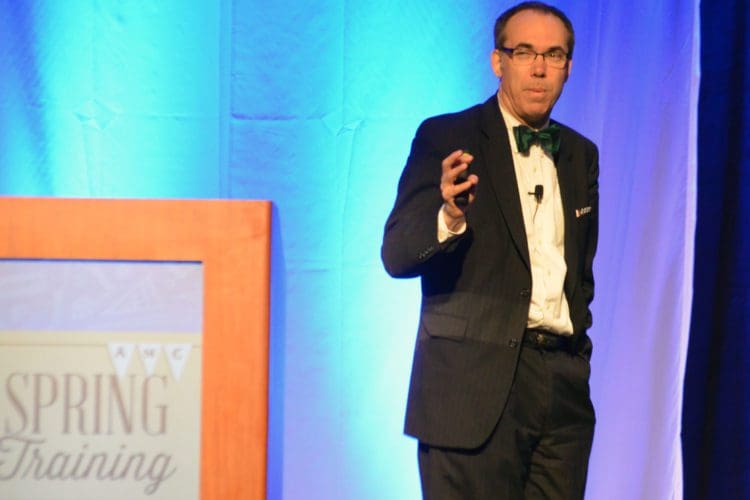Presentations
ELLIOT EISENBERG, Ph.D., loves to speak about economics. He’ll educate and entertain and make your event memorable. Elliot can present on any number of economic issues, including macroeconomic conditions such as GDP growth, interest rates, unemployment, inflation, and currency movements, or the health of the housing market and real estate, demographics, energy prices, household behavior, wages growth, income inequality, automobile sales, and many other topics. Over the last ten years, Elliot has spoken to hundreds of groups on a wide variety of economic topics.
You can view recordings of some of Elliot’s presentations on the “Elliot on Stage” page, or by checking out his YouTube channel:
Why Elliot Eisenberg is NOT your Average Public Speaker
Economics is boring, right? Not with Elliot Eisenberg! While Elliot lives, works, breathes, and thinks economics, he realizes that for most of us, that’s not the case, and he has spent years developing his uniquely passionate and entertaining presentations. While he starts with the expected charts and graphs, he immediately ramps up audience engagement. Walking around the room? Check! Engaging one-on-one with audience members? Check! Jumping on tables? After checking for stability first - Check! As a child, Elliot struggled, like many of us do, with boring teachers and topics, and so he has specifically developed his presentation style to pull in only the most contemporary topics and make them relevant and understandable. Your time is valuable, and he won’t waste it. Your attendees will stay for the entire presentation and walk out smiling!
Live or Virtual?
While the best way to get the full ‘Eisenberg Economics Experience’ is in person, Elliot is equally capable of engaging with audiences and teams in the virtual environment. When the business world shifted to the virtual and work-from-home during the pandemic, Elliot pivoted as well and reformatted his presentations to the virtual environment. He has done hundreds of virtual presentations since 2020, with thousands of attendees, and received excellent feedback. If you are interested in a virtual presentation, reach out to Elliot to discuss.

Live or Virtual?
While the best way to get the full ‘Eisenberg Economics Experience’ is in person, Elliot is equally capable of engaging with audiences and teams in the virtual environment. When the business world shifted to the virtual and work-from-home during the pandemic, Elliot pivoted as well and reformatted his presentations to the virtual environment. He has done hundreds of virtual presentations since 2020, with thousands of attendees, and received excellent feedback. If you are interested in a virtual presentation, reach out to Elliot to discuss.
Check Out Some of Elliot's Most Popular Speeches!
The Economic Forecast

In this always entertaining and very informative presentation on the economy that frequently begins with a fun and fast-moving “top ten list,” Dr. Eisenberg discusses how GDP will perform, what interest rates will do, how the labor market will behave, how much will firms spend, how the residential housing sector and real estate in general will perform and how a whole host of other economic variables (including incomes, auto sales, savings rates, energy prices, exports, government spending and so on) are bound to impact the economy this year (no sugar-coating), and why! Learn how to keep the (economic) forest in your view and not lose sight of the (data) trees!
The Economy and the Housing Market

This talk begins by reviewing the health of the national economy and the national market to better put local economic conditions into context. Dr. Eisenberg first discusses GDP, inflation, employment, wages, and interest rates and then moves on to housing prices, mortgage rates, new home construction, housing affordability, inventories, declining homeownership rates, demographics, and more. Dr. Eisenberg then turns his attention to the condition of both the local and state economy and housing market and how they compare to nearby states and cities in terms of unemployment, employment growth, personal income, housing starts, housing prices, and more.
The Economic and Energy Forecast

Attend this entertaining and informative presentation on the economy and energy. Dr. Eisenberg begins this talk by looking at how GDP growth will perform, what interest rates will do, and how wages, labor markets, and other economic variables are likely to perform and impact the economy before turning his attention to how energy markets will behave over the next year. Learn how pricing for WTI, Brent, and natural gas will perform, how the demand for petroleum products will change, what the expected impact of lifting the export ban on crude oil will do to world and domestic energy prices and international oil markets, and the significance of fracking. Special attention will also be devoted to automobile and SUV sales, automotive credit conditions, new car registrations, changing American driving patterns, CAFE requirements, fleet age, renewable energy, gasoline taxes, and more.
The Unintended Consequences of Government Regulation

This absolutely hilarious presentation teaches audience members why government intervention is generally a bad idea. It may be a new CFPB requirement, a new building code requirement, higher capital levels for financial institutions, a rise in the minimum wage, or something completely different. Whatever it is, this talk shows, using simple economics, how these regulations raise the price of whatever it is being regulated, decrease its supply, raise the price of alternatives, and moreover, cause all kinds of negative unintended consequences that frequently hurt the very people the law is trying to help. By the end, the audience understands what it takes to make better regulations that don’t create unintended consequences.
Book the Bowtie Economist at Your Next Event!
Elliot Eisenberg loves to speak about economics. It can be about macroeconomic conditions such as GDP growth, interest rates, unemployment, inflation, currency movements, the health of the housing market and real estate, demographics, energy prices, household behavior, wage growth, income inequality, automobile sales, and many other topics.
